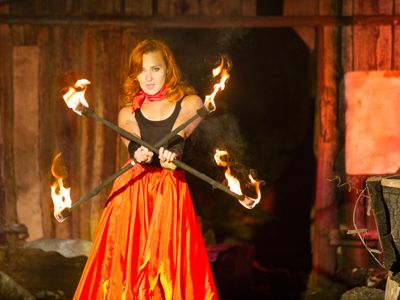
Romeo and Juliet - Extract 1
This GCSE English Literature quiz is the first of two extract questions for Romeo and Juliet by William Shakespeare. It takes place during the first act of the play, after Romeo and his friends have decided to attend a party at the Capulet house, despite not having been invited. This passage presents Capulet and his cousin in fond conversation about their younger days and ends with the famous moment when Romeo and Juliet first meet. Read the passage through at least twice before tackling the questions. When answering, pay close attention to the text while also bearing in mind the wider issues of the play as a whole.
How to answer an extract question in an exam:
Ensuring you always read through the given passage more than once will improve your ability to answer extract questions in exams.
CAPULET: How long is’t now since last yourself and I
Were in a masque?
CAPULET’S COUSIN: By’r Lady, thirty years.
CAPULET: What, man, ‘tis not so much, ‘tis not so much.
‘Tis since the nuptial of Lucentio,
Come Pentecost as quickly as it will,
Some five-and-twenty years; and then we masqued.
CAPULET’S COUSIN: ‘Tis more, ‘tis more. His son is elder, sir.
His son is thirty.
CAPULET: Will you tell me that?
His son was but a ward two years ago.
ROMEO [to a SERVINGMAN]: What lady’s that which doth enrich the hand
Of yonder knight?
SERVINGMAN: I know not, sir.
ROMEO: O, she doth teach the torches to burn bright!
It seems she hangs upon the cheek of night
As a rich jewel in an Ethiope’s ear—
Beauty too rich for use, for earth too dear.
So shows a snowy dove trooping with crows
As yonder lady o’er her fellows shows.
The measure done, I’ll watch her place of stand,
And, touching hers, make blessèd my rude hand.
Did my heart love till now? Forswear it, sight,
For I ne’er saw true beauty till this night.
TYBALT: This, by his voice, should be a Montague.
Fetch me my rapier boy. [Exit page]
What, dares the slave
Come hither, covered with an antic face,
To fleer and scorn at our solemnity?
Now, by the stock and honour of my kin,
To strike him dead I hold it not a sin.
CAPULET [standing]: Why, how now, kinsman? Wherefore storm you so?
TYBALT: Uncle, this is a Montague, our foe,
A villain that is hither come in spite
To scorn at our solemnity this night.
CAPULET: Young Romeo, is it?
TYBALT: ‘Tis he, that villain Romeo.
CAPULET: Content thee, gentle coz, let him alone.
A bears him like a portly gentleman,
And, to say truth, Verona brags of him
To be a virtuous and well-governed youth.
I would not for the wealth of all this town
Here in my house do him disparagement.
Therefore be patient, take no note of him.
It is my will, the which if thou respect,
Show a fair presence and put off these frowns,
An ill-beseeming semblance for a feast.
TYBALT: It fits when such a villain is a guest.
I’ll not endure him.
CAPULET: He shall be endured.
What, goodman boy, I say he shall. Go to,
Am I the master here or you? Go to —
William Shakespeare, Romeo and Juliet (Norton, 2008)
Ready for more?
not all...
quizzers. Try to win a coveted spot on our Hall of Fame Page.







